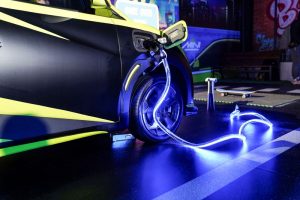German carmaker Volkswagen said on Wednesday it was selling off its entire Xinjiang operation after a year of controversies around the plant in the western Chinese region notorious for vast labour abuses.
Volkswagen and its Chinese partner SAIC Motor agreed to sell the plant to a Shanghai government-owned buyer, the carmaker said.
The buyer, Shanghai Motor Vehicle Inspection Certification (SMVIC), will take on all the plant’s employees and also take over SAIC/VW’s test tracks in Turpan Xinjiang and Anting in Shanghai.
Also on AF: Trump Outlines Plan For New Tariffs on Canada, Mexico and China
The transaction value of the deal was not revealed.
VW’s decision to sell the plant comes after years of investor pressure on the carmaker to abandon presence in Xinjiang, where rights groups have documented abuses including mass forced labour in detention camps.
Beijing denies any rights abuses occur in the region.
Even so, controversies around VW’s Xinjiang plant have been especially in focus over the past year. In December, senior staff at a German consultancy distanced themselves from an audit by the firm that found no forced labour at VW’s Xinjiang plants.
Weeks later, a German business newspaper reported it had evidence that forced labour was used in the construction of VW’s test track in Turpan. Following the report, Volkswagen said it was in “talks” with SAIC about “the future direction of business activities” in Xinjiang.
The significance of the plant, which previously assembled Volkswagen’s Santana vehicle, has dwindled in recent years after the carmaker cut jobs, leaving about 200 employees to just conduct final quality checks and handing over vehicles to dealers in the region.
Volkswagen has denied reports that it kept the plant open as a condition from Beijing to keep producing across China.
Expanding China tie-ups
The deal with SMVIC means Volkswagen will no longer have a presence in Xinjiang.
But the carmaker has said it will extend its partnership with Chinese state-owned automaker SAIC by a decade to 2040.
The joint venture aims to release 18 new models by 2030, including two extended range models for Chinese consumers in 2026.
The push is part of VW’s effort to regain market share in China, its largest market where it is battling flagging sales, intense competition and sluggish demand.
VW, which has lost its title as the best-selling brand in China to BYD, is also working with Chinese partners like Xpeng to develop new models better suited to Chinese consumers, aiming for over 30 new electric or hybrid models by 2030.
- Reuters, with additional editing by Vishakha Saxena
Also read:
US Adds 30 More China Firms to Uyghur Forced Labour Blacklist
CATL, Gotion Under Scrutiny in US Over ‘Use of Forced Labour’
German Firms May Exit Xinjiang, China Hopes They Don’t
Volkswagen’s China Troubles Worsen Amid New Forced Labour Claim
Volkswagen Says ‘Don’t Want to Give Up’ China EV Market
Senior Auditors Wary on Review of VW Plant in China’s Xinjiang
China Sanctions US Firm Over Xinjiang-Related Investigations
Volkswagen Buys $700 Million Xpeng Stake to Lift China EV Share
Germany Denies VW China Guarantees on Rights Concerns – Spiegel























